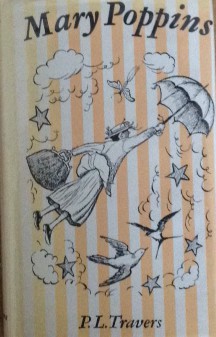Inspiring Young Readers
 posted on 26 Feb 2017
posted on 26 Feb 2017
Mary Poppins by P. L. Travers
If, like me, your only knowledge of the story of Mary Poppins comes from the Disney movie starring Julie Andrews and Dick Van Dyke, reading the original book by Pamela Travers is going to come as something of a surprise. It has to be said right at the outset that any similarity between book and film is at best marginal and for the most part, non-existent. I also hasten to say that I think Disney's movie is a fine piece of film-making and there's plenty to love about it - it's just that the film and the book are really completely different experiences.
The Mary Poppins of the book arrives to be nanny to the children of the Banks family - blown to their door by an uncontrollable wind that crashes her to the front door. Mary is a strange looking woman (she is described as looking like a wooden Dutch doll ) with what seems to be an unprepossessing personality - grumpy, irritable and vain. However despite her seemingly shorter than short temper, she soon makes herself indispensable to the children.
It doesn't take long for the children to realise that Mary Poppins is no ordinary nanny and the book is structured around a series of magical events that teach them some important lessons about life and growing up. I think it's tempting to simply think of Mary as indefinably 'magical' but that's too easy and simple as a characterisation; to my mind she is elemental, a force of nature, someone with the attributes normally associated with a goddess of Classical mythology. She is capable of time travel, the altering of reality, she can talk to the animals and she knows where the secret portals are to other realities.
At another level she is the perpetual child – self-obsessed, wilful and impatient. In a telling chapter involving the Banks' new-born twins we discover that babies under the age of one and before they develop teeth also have this privileged understanding of the unseen world, the world denied to us as we grow older. We are told that Mary never lost this gift - that she is 'the Great Exception' - and this accounts for her 'powers'. In this respect we have to see her as in some way permanently childlike and in touch with some fundamental truths about the world that we lose as we get older. This is set of perceptions that would have been entirely understandable to William Blake or the young Wordsworth and Coleridge in their Lyrical Ballads phase.
This slim book is in every way remarkable. What seems at a casual glance to be a rather conventional fantasy story turns out to be a challenging and multi-layered book that can be read and interpreted in numerous ways.
Oh, and by the way, there are no cockney chimney sweeps here either..... sorry Dick.
Terry Potter
February 2017